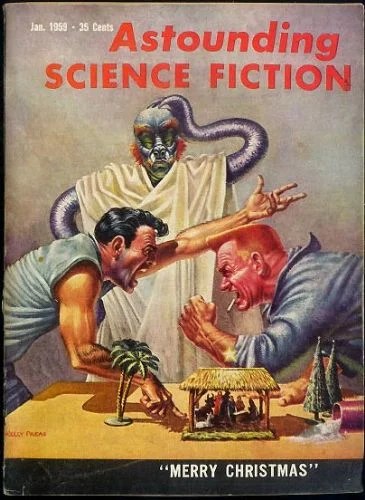Happy (day after) Thanksgiving from sunny San Diego! Sorry for the delay, but the travails of travel put a crimp in my bi-daily update schedule. I am now happily back at the typewriter and ready to tell you all about….

The January 1959 Astounding was particularly lackluster. Filled with turgid tales of men running world governments with smug omnipotence, it was quite the slog. Some details:
“To Run the Rim,” was the stand-out exception, as described earlier this week. Sadly, it simply set the bar higher for the subsequent stories, which did not even try to clear the hurdle.
Gordy Dickson's “By New House Fires,” wasn't bad so much as inconsequential. In this story, humanity has made the planet unlivable for any but humans, animals being found solely in preserves. I've seen this concept before, and I never buy it. I have no trouble believing that humans will run pretty roughshod over planet Earth, and many thousands if not millions of species will be the casualties. We may pollute the world into a stinking mess and/or incinerate the surface in atomic hellfire, but we'll never reduce its inhabitants to people and food-yeast. Of course, Dickson's set-up is necessary for the tale: the story of the world's last dog, and the master he adopts.
Oh look! The next story is a Poul Anderson, surprise, surprise. In premise, “Robin Hood's Barn,” is not unlike Piper's story in the last Astounding following the leader of a decadent Empire. In this case, the Empire is solely terrestrial, only one inhabitable extrasolar world having yet been discovered. This is the story that predicated my recent rant on the dearth of women in science fiction. Though it takes place far in the future, all government is run by men, and worse still, it is one of those smug stories where the person in charge has perfect Machiavellian control of the various competing factions beneath him.
I suppose I must sound hypocritical. After all, I gave Piper's story a pass (and even a favorable grade). I think the difference is two-fold: Piper's story was meant to be somewhat fanciful. Moreover, I've seen Piper write strong women. Anderson's never tried (except that isn't quite true—he managed five years ago in Brainwave, his one excellent book). Maybe Piper is just as bad, but Anderson was the straw that broke my back.
“Seedling,” by Charles V. de Vet (he worked with Katherine MacClean in Astounding earlier this year) is a pleasant, albeit brief, interlude about the drastic steps one might take to establish relations with an alien race. The twist is nice, too.
All too soon, we're plunged back into another top-level womanless depiction of world government: “Deadlock,” by Robert and Barbara Silverberg. This is one of those old-fashioned stories in which a problem is introduced and the solution comes as a gotcha at the last second. What's particularly frustrating is the Silverbergs spend 40 pages on what should have been a 10-page tale.
Here's the set-up: It is a hundred years from now, and humanity is on the eve of settling Mars. The Americans want to terraform the planet; the Chinese want to biologically engineer humans to settle the planet as is. One intrepid U.N. representative is tasked with finding a suitable compromise. This set-up is described over and over again in several slightly varying ways (newspaper clippings, interviews with officials on both sides) until the inevitable and unclever solution is presented. It would be fine as backdrop to characterization, or as bookends to a novel, but it just can't bear the weight of a novella.
One has to wonder if John Campbell simply needed to fill space and asked the Silverbergs to pad their submission out. Since authors are paid by the word, I can imagine there was little resistance to the idea.
Now, I do have some praise for the story. I am impressed with anyone willing to throw her or his hat over the fence and make a timeline of future history, especially when it makes assumptions that few others do. For instance, in this world, the Soviet Union collapses in the early 21st century not from American success in a Third World War, but from economic inadequacy. An economically revitalized (but probably still Communist) China takes its place as a superpower. The U.N.'s power is enhanced after an abortive and politically fraught Space Race. While this makes for a more peaceful Earth, preventing large-scale conflicts, it also means that any plan to settle other planets requires a consensus of most of the Earth's countries. Hence, the presented dilemma. It's a plausible set-up, they just don't do much with it.
I am also impressed with how far science fiction (and science) have come. Just 16 years ago, Heinlein was writing about transforming humanity at glacial speed through selective breeding a la Mendel. Genetic engineering reduces the process time to a single generation. I look forward to seeing more stories with this development as a component.
There's more, but I find myself in danger of over-writing this column, so I'll save it for next time.
(Confused? Click here for an explanation as to what's really going on)
This entry was originally posted at Dreamwidth, where it has comments. Please comment here.
